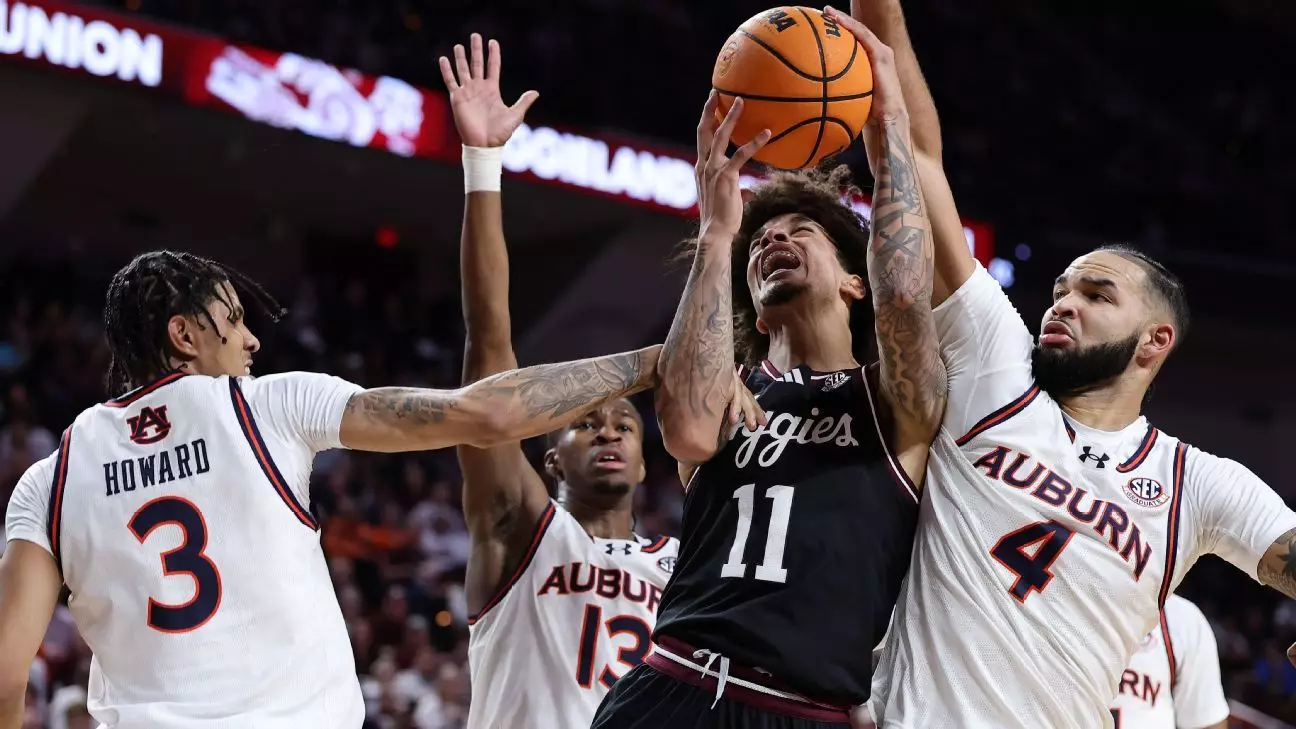In an unexpected and resounding defeat, the once-unshakable Auburn Tigers fell prey to the relentless, physical style of play exhibited by Texas A&M. Coach Bruce Pearl dissected the loss, attributing his team’s downfall to their inability to withstand the Aggies’ dominance, a stark reminder that in sports, physicality can overshadow tactical superiority. Auburn’s failure to assert themselves physically illustrates a crucial lesson for teams that enjoy a position at the top: complacency can result in vulnerability. Auburn’s reign as the No. 1 team in the nation—a position they held for eight weeks—was undermined, shedding light on the fragility of such accolades.
More Than Just Statistics
Pearl pointed out an alarming statistic—Texas A&M’s 24-9 advantage on offensive rebounds—demonstrating not only their physicality but also a lack of tenacity from Auburn. On paper, stats often dictate the narrative, but anyone who has watched a game knows that the effect of grit cannot be quantified. While numbers show dominance, they fail to capture the hustle plays, the diving for loose balls, and the sheer will to win that characterize a team’s spirit. In sports, this intangible element is what separates the elite teams from the mere contenders. Texas A&M’s game plan revolved around exploiting these small yet significant efforts, suggesting that Auburn’s players weren’t completely ready for the battle that lay ahead.
Injury Impact: Beyond the Obvious
Star player Johni Broome’s recent struggles raise questions about the psychological and physical impacts of injuries on athletes. With an average of 18.4 points per game, Broome’s decline to a mere 8 points during this loss showed that injuries can erode confidence and performance. Pearl indicated that Broome had previously suffered a shoulder injury, and how that translated into the game against Texas A&M was apparent. Injured athletes often play with a level of trepidation, and Broome’s fear of re-injury could have undoubtedly played a role in Auburn’s performance. This highlights a broader theme in college sports: the importance of mental health and readiness for athletes facing injuries.
Missed Opportunities and the Importance of Depth
As if Auburn’s struggles weren’t compounded enough, the absence of Denver Jones due to an ankle injury proved to be an influential omission. Jones’s reputation as Auburn’s standout one-on-one defender stood as a beacon of the team’s strategic capabilities. His absence left the Tigers vulnerable, a situation exacerbated by a lack of depth in the roster. When teams rely heavily on their star players, the failure of just one can lead to disaster. In contrast, depth not only spreads the burden of performance but also fosters resilience. Auburn’s defeat serves as a poignant reminder about the critical nature of maintaining a roster capable of weathering the storm when stars go down.
Cultural Significance: Rebuilding from Within
Texas A&M’s victory against the top-ranked team holds tangible significance, especially on Senior Night. Players like Wade Taylor IV took pride in their program’s evolution from obscurity to national prominence. This success feels deeply rooted in a culture of hard work and perseverance, underscoring an essential truth in athletics: sustainable success often stems from the seeds of dedication sown by players toiling through years of hard work. When teams are able to cultivate a culture of resilience and toughness, as A&M appears to have done, they position themselves not just for momentary triumphs but for sustained success. The narrative of building a program, particularly through the experiences of athletes who have invested their time and effort, creates an emotional connection that bolsters team spirit.
Looking Ahead: The Fragile Nature of Championship Aspirations
For Auburn, the implications of falling from the top ranks can either serve as a motivational catalyst or a stumbling block. As Pearl reflects on this tough loss, he must galvanize his players to recognize that their journey is far from over. Championship aspirations are like glass—beautiful but easily shattered. Auburn must analyze its weaknesses and confront the mental rather than physical challenges posed by formidable opponents. At the intersection of skill, physicality, and psychological resilience lies the essence of successful athletic programs. The defeat against Texas A&M, despite being painful, can evolve into a crucible moment for Auburn, transforming their approach as they set their sights on upcoming challenges.


Leave a Reply